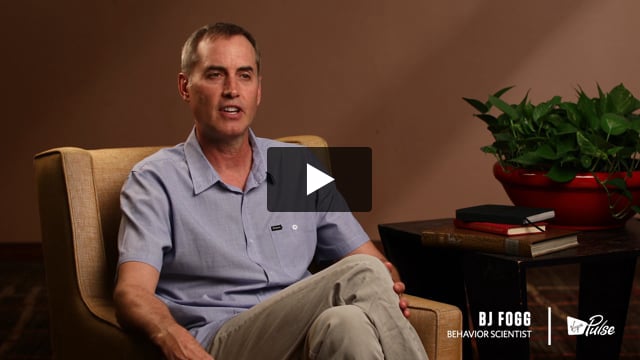Speaker Fee Range:
Travels From:
Related Categories:
BJ Fogg
BJ Fogg is best known for promoting the concept of “captology,” a word he coined to describe the overlap between persuasion and computers. The founder of the Stanford Persuasive Technology Lab is one of the most sought-after thinkers in Silicon Valley today. As a psychologist he brings a new perspective on working with technology innovations. He holds at least seven patents, and has additional patents pending.
BJ Fogg has held full-time positions at Interval Research, HP Labs, Sun Microsystems, and Casio Research. In 2003, shortly after publishing his book, he began investigating how computers can help people develop close personal relationships. This work has led to a startup and Internet service YackPack. Stanford University awarded BJ the Maccoby Prize in 1998 for four years of experimental research on how computers can change people’s attitudes and behaviors.
He is the founder and director of Stanford's annual Mobile Health conference.…
Forget Big Change, Start with a Tiny Habit
Have you ever wondered if making small changes could make a difference? Struggling to make changes to improve your life? Dr. BJ Fogg, is the author of the bestseller, Tiny Habits: The Small Changes that Change Everything. He has researched human behavior for over 20 years at Stanford University. BJ’s theory is that “Behavior happens when Motivation, Ability, and a Prompt come together at the same moment.”
Psychology and Innovation
When it comes to industry work, BJ seeks to leverage his strongest area: the overlap of psychology and innovation. In other words, he is most interested in projects that combine the skills of a psychologist with the ability to innovate. This approach has led to new products and patents. Combining psychology and innovation helped him to create a new academic area of research: Persuasive Technology.
Persuasive Technology
BJ Fogg speaks on the topic of his book, Persuasive Technology - Using Computers to Change What We Think and Do. Persuasive technology is broadly defined as technology that is designed to change attitudes or behaviors of the users through persuasion and social influence, but not through coercion. Such technologies are regularly used in sales, diplomacy, politics, religion, military training, public health, and management, and may potentially be used in any area of human-human or human-computer interaction. Most self-identified persuasive technology research focuses on interactive, computational technologies, including desktop computers, Internet services, video games, and mobile devices, but this incorporates and builds on the results, theories, and methods of experimental psychology, rhetoric, and human-computer interaction.
Mobile Healthcare Technology Trends



What factors influence the speaker's fee?
Other factors that influence a keynote speaker's fee include their reputation, expertise, demand, experience, duration of the presentation, travel requirements for the event location, and any additional services, activities or customization options they offer.
Are travel expenses included in the speaker's fee?
Travel expenses are typically not included in the listed speaker's fee and are quoted separately. If the speaker needs to travel internationally, fees will be higher. These expenses may include airfare, accommodation, ground transportation at home and in the event city, and meals. We can provide more detailed information about travel expenses and arrangements once you've selected a speaker.
How do I book BJ Fogg for my event?
The speaker booking process typically involves the following steps:
- Browse our website or reach out to a Key Speakers advisor through our website to explore speaker ideas.
- Select a keynote speaker based on their expertise, experience, and suitability for your event.
- Contact Key Speakers to confirm the speaker's availability, fees, and any unique requirements. We can also help negotiate fees and terms.
- Submit a firm offer to extend the invite to your speaker. These details will be used to create an agreement once the speaker accepts.
- All parties coordinate and finalize the terms of the booking, including contract terms and conditions.
- Confirm the booking by signing the contract and making the necessary payments.
What types of events do keynote speakers typically speak at?
Keynote speakers can speak at a wide range of events, virtual or in person, including conferences, corporate meetings, industry conventions, seminars, workshops, fundraising galas, educational programs, and other special occasions where an inspirational or informative address is desired.
How do I select the right keynote speaker for my event?
When selecting a keynote speaker, consider the following factors:
- The speaker's expertise and knowledge relevant to your event's theme or industry.
- Their speaking style, ability to engage the audience, and deliver impactful messages.
- Past client testimonials, reviews, or references.
- The speaker's availability and fee within your budget.
What are the payment terms and conditions?
A deposit is required upon signing the contract, with the remaining balance due 2–4 weeks before the event. If the event is taking place within 30 days, the full balance is due upon signing.
How far in advance should I book a keynote speaker?
It is generally advisable to book a keynote speaker as early as possible, especially if you have a specific speaker in mind or if your event is during a peak season holiday. Ideally, booking a speaker three to six months in advance can increase the chances of securing your desired speaker.
Can you help me with the logistics and technical requirements for the speaker's presentation?
Yes, we can assist you with the logistics and technical requirements for the speaker's presentation. We stay actively involved during pre-event planning to coordinate with you and ensure that the necessary audiovisual equipment, staging, lighting, and other technical aspects are in place for a successful presentation.
Are there any special requirements or accommodations that need to be considered for the speaker?
Keynote speakers may have specific requirements or accommodations that need to be considered, such as travel arrangements, accommodation preferences, dietary restrictions, or accessibility needs. Some speakers have a performance rider we include in the contract, others have minimal requirements.
Do keynote speakers offer customization options for their presentations?
Yes, many keynote speakers offer customization options for their presentations. They can tailor their content, examples, or case studies to align with your event's theme, industry, or specific audience. Discuss your customization needs with us so we can guide you accordingly.
Can the speaker participate in pre-event activities such as panel discussions or Q&A sessions?
Some keynote speakers are open to participating in pre-event activities such as panel discussions, Q&A sessions, or meet-and-greet sessions. Please share your specific requirements with us during the firm offer phase, so we can work on getting you everything you need.
How long is a typical keynote speech?
The duration of a standard keynote speech can vary depending on the speaker and the event's schedule. Typically, keynote speeches range from 30 minutes to 90 minutes, including any Q&A sessions or interactive elements. Some speakers can accommodate half or full day sessions and extended keynotes. Discuss the desired duration with your representative to determine the appropriate length for participation.
Can I provide feedback or reviews about the speaker's performance?
Yes, we encourage and appreciate feedback about the speaker's performance as well as our services. You can share your feedback via email after the event, or via our survey feedback form. Your feedback can help them improve our services and assist other clients in making informed decisions.
Are there any discounts or special offers available for booking multiple speakers or multiple events?
Often, yes. It's worth inquiring about such possibilities with your Key Speakers representative to explore any available cost-savings options.
Why book BJ Fogg though Key Speakers?
- We provide a comprehensive service that takes the guesswork out of hiring a speaker—from speaker selection to logistics to post-event feedback. We know you have lots of responsibilities on top of finding and coordinating event speakers, so having a committed and proactive partner on your side that is an expert with the talent booking process is crucial. Every time you book a speaker with Key, your dedicated events manager will support you throughout the entire planning process. We work closely with you from speaker selection to post-event success and always ensure that your needs are addressed first.
- We help you negotiate contractual details such as speaker fees and travel terms so that you end up with the most favorable deal. Leave the fine print to us so you can focus on other aspects of your event. Key Speakers mediates and absorbs some of the contractual risks that inherently come with booking a keynote speaker.
- With our highly communicative booking and proposal model, you'll never be left in the dark with the status of your speaker. We pride ourselves on speedy response time and always keep you updated on all new developments relating to your event. Our experienced agents are personable (after our morning coffee!) and always eager to do whatever it takes to secure a fantastic speaker for your event.
To put it simply, Key Speakers is your one-stop resource for finding, booking and managing speakers for your event. We do the heavy lifting for you. Our dedicated and knowledgeable advisors ensure that your speaker's message and personal brand perfectly align to your event objectives.
Remember that the specific details and offerings may vary among different speakers, so it's always recommended to consult with your Key Speakers representative for accurate information and assistance.
Speaker Fee Range:
Travels From:
Related Categories:
Request BJ Fogg
Connect with us to learn more about booking this speaker for your event.


